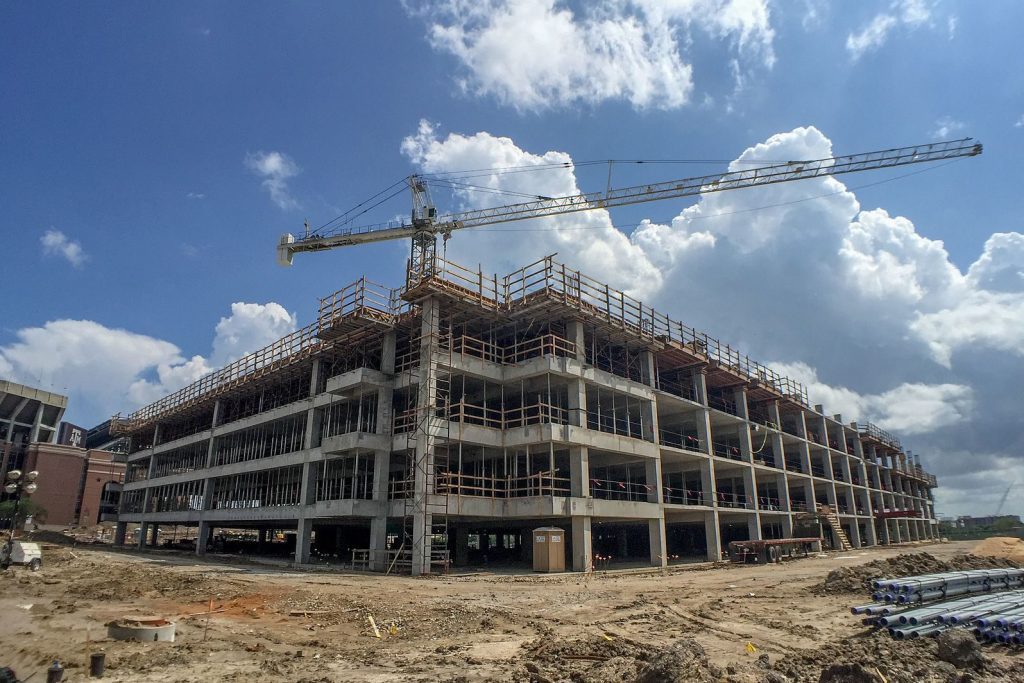Skift Take
Hotel builders shouldn't get too optimistic by a record-setting month. It can take as long as a year for economic downturns to reflect in the construction industry.
If you’re seeking indicators of how coronavirus is impacting the U.S. economy, you won’t find it with hotel construction activity — yet.
There were 214,704 hotel rooms under construction in the U.S. at the end of March, according to STR. It is the highest end-of-month construction total ever recorded by the hotel data firm. The previous record high was one month earlier in February, when STR reported 211,859 rooms under construction. But the pace of construction often lags disturbances in the economy, and the hotel pipeline will almost certainly cool off, especially with projects still in the planning phase.
“The number of rooms in construction will likely remain high, just as it did during the pre-recession peak,” STR Senior Vice President of Lodging Insights Jan Freitag said. “Because of the coronavirus pandemic, the industry is no longer operating in a record-setting demand environment, so there isn’t the same rush to open hotels and tap into that business.”
Get the Latest on Coronavirus and the Travel Industry on Skift’s Liveblog
Four markets — New York City, Las Vegas, Orlando, and Los Angeles — each reported more than 6,000 rooms under construction. New York led the pack with 14,051 rooms under construction at the end of March. The last hotel construction peak came in December 2007, when nearly 212,000 hotel rooms were under construction at the start of the Great Recession. Projects that were already under construction continued while those in the planning stage were often tabled, Freitag said.
The strength in construction may seem like a stark contrast in a month where hotel occupancy rates fell to single-digits at some properties due to coronavirus. Some properties suspended operations due to such low revenue.
It can take time for a poor economy to ripple into construction sites, but some projects are already getting suspended in the current downturn. Thirty U.S. hotel projects in various stages of planning were deferred, and eight were completely abandoned last month, STR reports.
“This time is a little different with construction moratoriums in certain places, but the majority of projects that are underway at the beginning of a downturn will complete. These projects by and large are financed, have debt and equity in place, and will continue,” Colliers International Managing Director of Research and Client Services Aaron Jodka said. “Warehouses are usually the first to respond because it takes less time to build one.”
Some municipal governments curtailed construction as a precaution against spreading coronavirus. Boston Mayor Martin Walsh issued a construction moratorium, which the neighboring city of Cambridge, Massachusetts, later joined. Non-housing commercial projects were temporarily suspended in the Bay Area, and a Pennsylvania shelter-in-place order temporarily halted construction work. But the temporary bans aren’t expected to have as much of an impact on the hotel development pipeline as the expected slow return to travel.
“That is so small in the scheme of things,” Freitag said. “If a project takes 24 months to build, and there’s a three-week moratorium, it’s hard to say that matters. It’s not very material.”
Following the 2008 financial crisis, hotel construction spending declined 70 percent from an October 2008 peak –10 months after the recession began – to its cycle low in January 2011, EY reports. There is typically between a nine to 12-month delay between a decline in GDP and an impact to commercial construction, EY Global Engineering and Construction Leader Erin Roberts said.
“While the construction industry is expected to be less affected than others by the economic effects of Covid-19 in the near term, that doesn’t mean it is necessarily better equipped than other sectors to handle the crisis,” Roberts added. “I would expect a significant decline in construction spending will come in early 2021, and companies need to be preparing their balance sheets and liquidity positions now to brace for a significant decline in activity — in many end markets but especially in lodging, entertainment, sports, and office buildings.”
Have a confidential tip for Skift? Get in touch
Tags: construction, coronavirus, str
Photo credit: The pace of U.S. hotel construction hit an all-time high in March, and it could take several months until coronavirus impacts project starts. Patrick Creighton / Wikimedia
